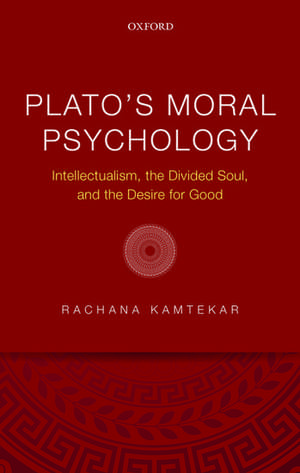Plato's Moral Psychology: Intellectualism, the Divided Soul, and the Desire for Good
Autor Rachana Kamtekaren Limba Engleză Hardback – 7 dec 2017
Preț: 478.74 lei
Preț vechi: 577.97 lei
-17% Nou
Puncte Express: 718
Preț estimativ în valută:
91.62€ • 93.83$ • 76.21£
91.62€ • 93.83$ • 76.21£
Carte tipărită la comandă
Livrare economică 08-14 martie
Preluare comenzi: 021 569.72.76
Specificații
ISBN-13: 9780198798446
ISBN-10: 019879844X
Pagini: 242
Dimensiuni: 148 x 218 x 22 mm
Greutate: 0.44 kg
Editura: OUP OXFORD
Colecția OUP Oxford
Locul publicării:Oxford, United Kingdom
ISBN-10: 019879844X
Pagini: 242
Dimensiuni: 148 x 218 x 22 mm
Greutate: 0.44 kg
Editura: OUP OXFORD
Colecția OUP Oxford
Locul publicării:Oxford, United Kingdom
Recenzii
Rachana Kamtekar has already won a niche for herself through a series of articles on Plato that are not only ingenious and original (as is now de rigueur, and often enough achieved), but also genuinely perceptive. This, her first book, pursues a seminal idea through a plurality of Platonic dialogues. An introduction helpfully highlights what is central and salient, and outlines what is to come; later résumés keep the reader on track. The result should enhance anyone's appreciation and enjoyment of these familiar yet elusive texts.
Notă biografică
Rachana Kamtekar has published many articles about ancient Greek and Roman moral psychology, and related areas, such as ancient moral and political philosophy and contemporary moral psychology, since her PhD (University of Chicago) in 1995.























